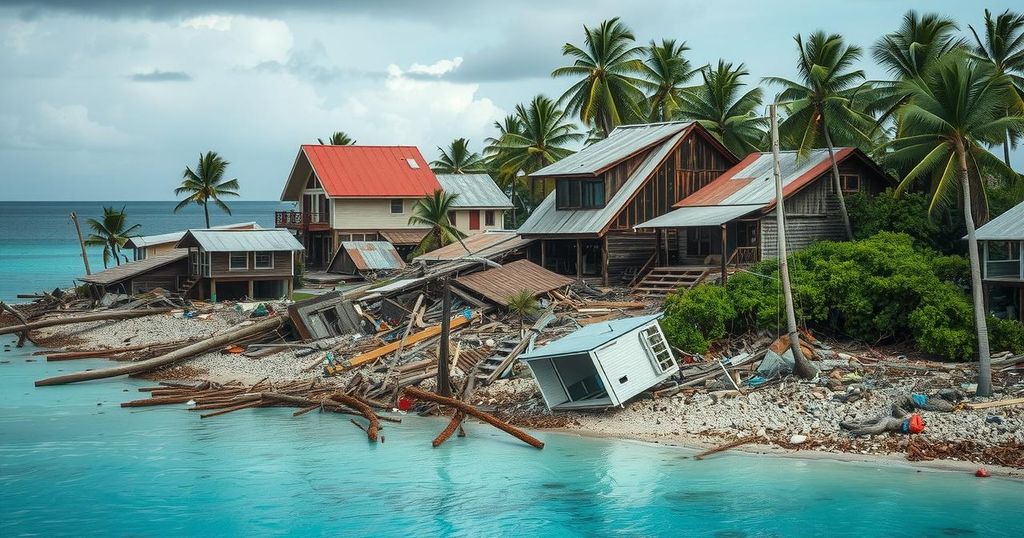Cyclone Chido has devastated Mayotte, causing hundreds of deaths and extensive destruction, with estimates suggesting the toll could rise to nearly 1,000. The cyclone, categorized as level four, has raised alarms in northern Mozambique, which is at risk of severe damage. In response, French authorities and international aid agencies are mobilizing efforts to assist affected populations, highlighting the ongoing challenges of climate change and disaster management in the region.
On Mayotte, a French territory in the Indian Ocean, Cyclone Chido has caused a catastrophic humanitarian crisis, with the death toll reaching several hundred and potentially nearing 1,000, as reported by local officials. Mayotte’s Prefect, François-Xavier Bieuville, indicated the immense difficulty in determining an accurate death count due to the extensive destruction inflicted by the cyclone on Saturday. Initial confirmations reported at least 11 fatalities, but considerable increases in this number are expected as the situation develops.
Having moved to the eastern coast of Africa, Chido posed additional concerns for northern Mozambique, where aid agencies are bracing for increased casualties and severe damage. The intense cyclone affected neighboring regions, including the Comoros and Madagascar, with Mayotte suffering the most significant impact. Officials characterized Chido as the most powerful cyclone to hit Mayotte in 90 years, with winds exceeding 220 kilometers per hour (136 miles per hour), categorizing it as a level four cyclone.
French Interior Minister Bruno Retailleau emphasized the challenges faced by Mayotte following an emergency meeting, stating that the island’s conditions were dire. Prime Minister François Bayrou spoke about the widespread destruction of public infrastructure, including essential services such as hospitals and airports, which have greatly impacted the local population, particularly those in vulnerable housing.
In response, over 1,600 police and gendarmerie officers have been deployed to assist in recovery efforts, while international aid is being mobilized, with rescuers and supplies being sent from France and Réunion. French President Emmanuel Macron has assured that he is closely monitoring the ongoing crisis. Meanwhile, Pope Francis has extended prayers for the victims during a visit to Corsica.
Cyclone Chido’s effects are expected to linger, having now made landfall in Mozambique, where over 2.5 million people in northern provinces are at risk. The aftermath of the cyclone poses significant threats, including flooding and potential outbreaks of waterborne diseases, highlighting the urgent need for aid as the cyclone season continues. Recent years have shown that such cyclones have intensified, correlating with climate change, prompting calls for increased support for vulnerable regions facing these crises.
Cyclones pose a significant threat to regions like the Indian Ocean, where nations like Mayotte face the dual challenges of natural disasters and socio-economic vulnerabilities. Cyclone Chido marks a devastating instance in this context, with the cyclone season in southern Africa regularly bringing severe weather patterns that can lead to extensive humanitarian crises. Addressing the impacts of climate change and the cyclical nature of such disasters underscores the need for global support toward affected nations, facilitating better preparedness and recovery efforts for the communities involved.
In summary, Cyclone Chido has resulted in catastrophic consequences for Mayotte, revealing the vulnerabilities of the island’s infrastructure and population to extreme weather events exacerbated by climate change. The devastation marks a significant tragedy, with numerous fatalities expected as rescue and aid operations continue. As Chido progresses into mainland Africa, the potential for further loss and distress remains high, emphasizing the urgent requirement for humanitarian support and preparedness in similarly affected regions.
Original Source: www.pbs.org






